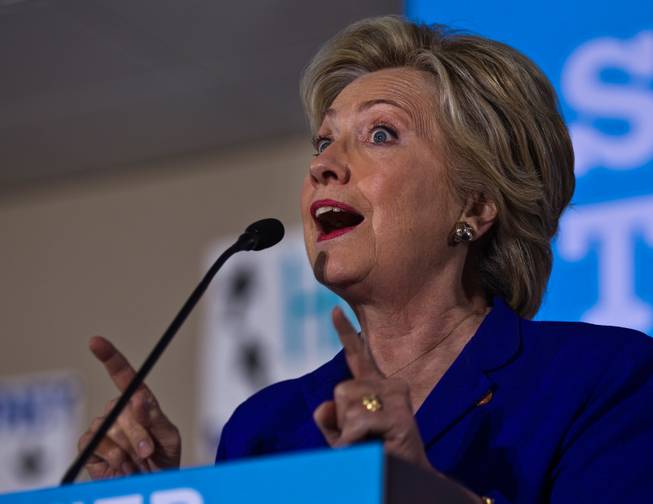
Hillary Clinton makes a point during a rally at the UA Local 525 Plumbers and Pipefitters Union building on Wednesday, Nov. 2, 2016.
Published Tuesday, Nov. 8, 2016 | 9:50 p.m.
Updated Tuesday, Nov. 8, 2016 | 10:25 p.m.
While Nevada's six electoral votes will go to Hillary Clinton, according to Associated Press projections, Donald Trump appears poised to be elected president of the United States.
National polls favored Clinton to win in the days leading up to the election, though surveys here in the Silver State had the candidates essentially tied.
It the first time since the 1940s Democrats have carried the Silver State in three consecutive presidential elections, backing Barack Obama in 2008 and 2012. If the national trend holds, it will be only the second time since 1912 that Nevada has not backed the national winner. Gerald Ford received Nevada's electoral votes in 1976, when Jimmy Carter won the national election.
Clinton’s victory in Nevada injected some life into the state Democrats’ watch party at Aria.
When the news flashed across a large television screen in a ballroom, the crowd erupted in hoots, hollers and applause followed by prolonged chants of “yes we can!”
The moment provided a brief interlude for what has otherwise been a more mellow atmosphere in this room, decked out with balloons and a “Nevada Together” banner. The Democrats, however, have had one other reason to cheer: Catherine Cortez Masto beating Republican candidate Joe Heck for the U.S. Senate seat.
It was a long, hard-fought battle for both presidential candidates, each of whom faced difficult battles during the primary. Clinton’s main foe was Vermont Sen. Bernie Sanders, who mobilized millennial and progressive voters while carrying the onus of reforming a “rigged” system.
Trump quickly attracted significant attention among his field of 17 Republican candidates for his bold, sometimes offensive, statements, but pulled quickly ahead of some of the most promising candidates, like Florida Sen. Marco Rubio and Texas Sen. Ted Cruz, in the nominating contests.
Clinton, also a former New York senator whose husband President Bill Clinton twice won Nevada, framed herself as someone who has fought for those without a voice since her days as a lawyer working for the Children’s Defense Fund, work that she continued as first lady of the United States. She ran on issues including implementing comprehensive immigration reform, making college debt-free, and protecting the country through a strong military and defense system.
Trump, who has never run or held office before, touted his business acumen, promising that he would bring an outsider’s perspective to Washington, D.C., to change the status quo and fight for the working men and women of America. Some of his biggest promises throughout the campaign included building a wall at the U.S.-Mexico border and deporting 11 million immigrants in the country without authorization, bringing back manufacturing jobs from overseas, and growing a strong military.
Throughout the campaign, Clinton was roundly criticized for her use of a private email server while secretary of state. An FBI investigation concluded that she had not violated the law but had been “extremely careless” in her handling of the server.
Opponents also criticized her for failing to do enough to prevent attacks in Benghazi, Libya, where attackers overran a U.S. consulate and killed U.S. Ambassador Chris Stevens and three other Americans. An investigation concluded that although security was lacking at the consulate, there was nothing Clinton could have specifically done to prevent the attack.
Among other issues, Trump sought to paint Clinton as the epitome of everything that is wrong with politics in America today, that she's out of touch with the American people and insulated in her own world of special interests and close advisers.
Trump, on the other hand, ran one of the most unconventional presidential campaigns in modern history. He managed to survive the primary with little ground game to speak of and was seemingly impervious to the backlash to his offensive statements and behavior at every turn.
Some of his supporters said they liked that Trump said what they were thinking and wasn’t afraid to be politically incorrect. Some of Trump’s more infamous moments from the campaign trail involved characterizing Mexican immigrants in the U.S. as “rapists and criminals," making fun of a disabled New York Times reporter and seemingly implying that Fox News anchor Megyn Kelly had asked him tough questions during the first Republican debate because she was menstruating.
Republican candidates down ballot seemed to only grudgingly support Trump as their party’s nominee throughout the campaign, constantly being asked to defend the most recent statements Trump had made on the trail. But it was only after Trump’s lewd comments on women captured on a hot mic to an “Access Hollywood” host in 2005 that many of them withdrew their support.
Trump’s opponents also called into question his business prowess, highlighting his bankruptcies in Atlantic City, his use of factories overseas to manufacture some of his namesake merchandise, and his non-accredited, for-profit Trump University, which was later sued by the New York attorney general for allegedly defrauding students.
In the last several months of the campaign, Clinton sought to push back against Trump’s divisive rhetoric by promising to build a country that was “stronger together,” while Trump returned to the message that had kicked his campaign off: “make America great again.”

Join the Discussion:
Check this out for a full explanation of our conversion to the LiveFyre commenting system and instructions on how to sign up for an account.
Full comments policy